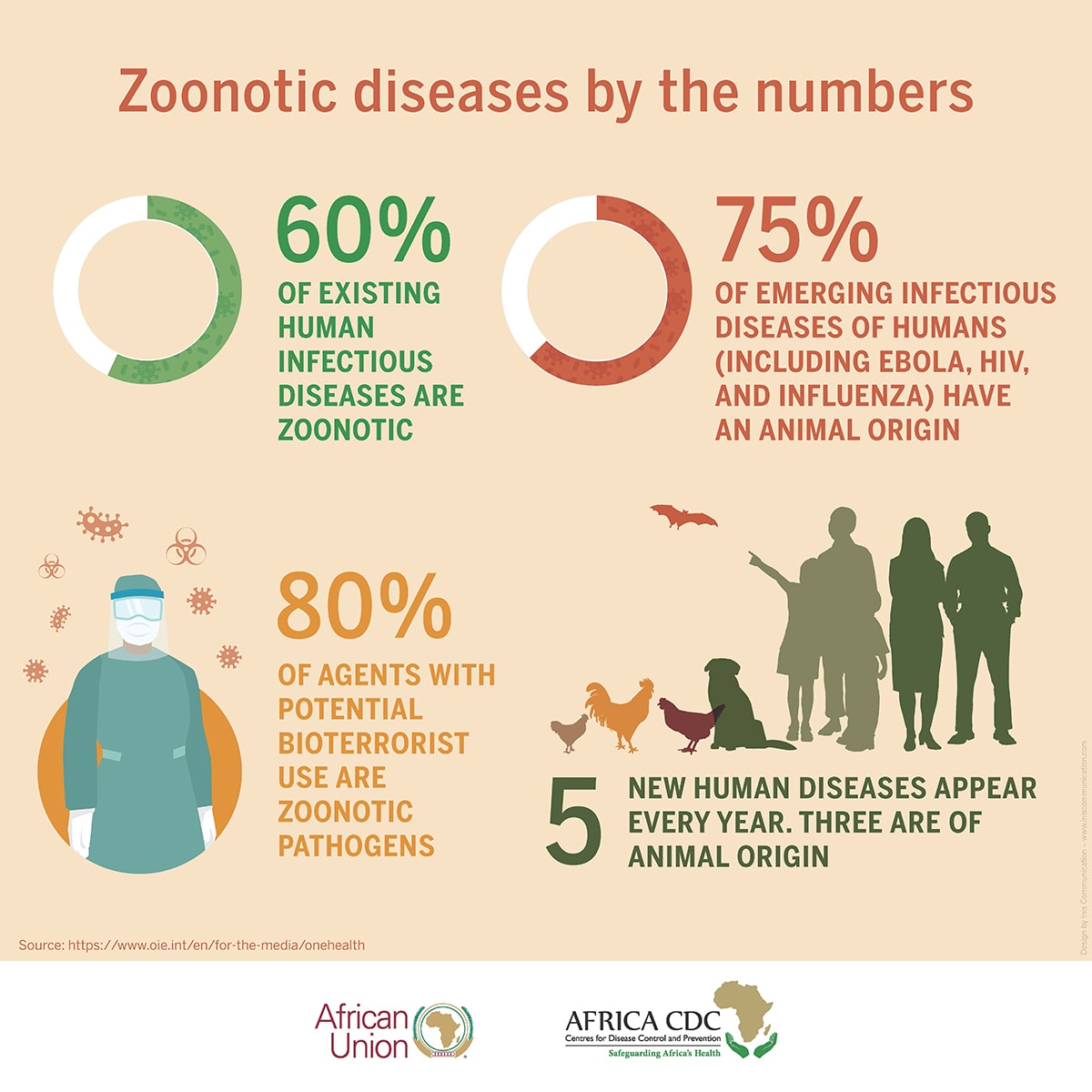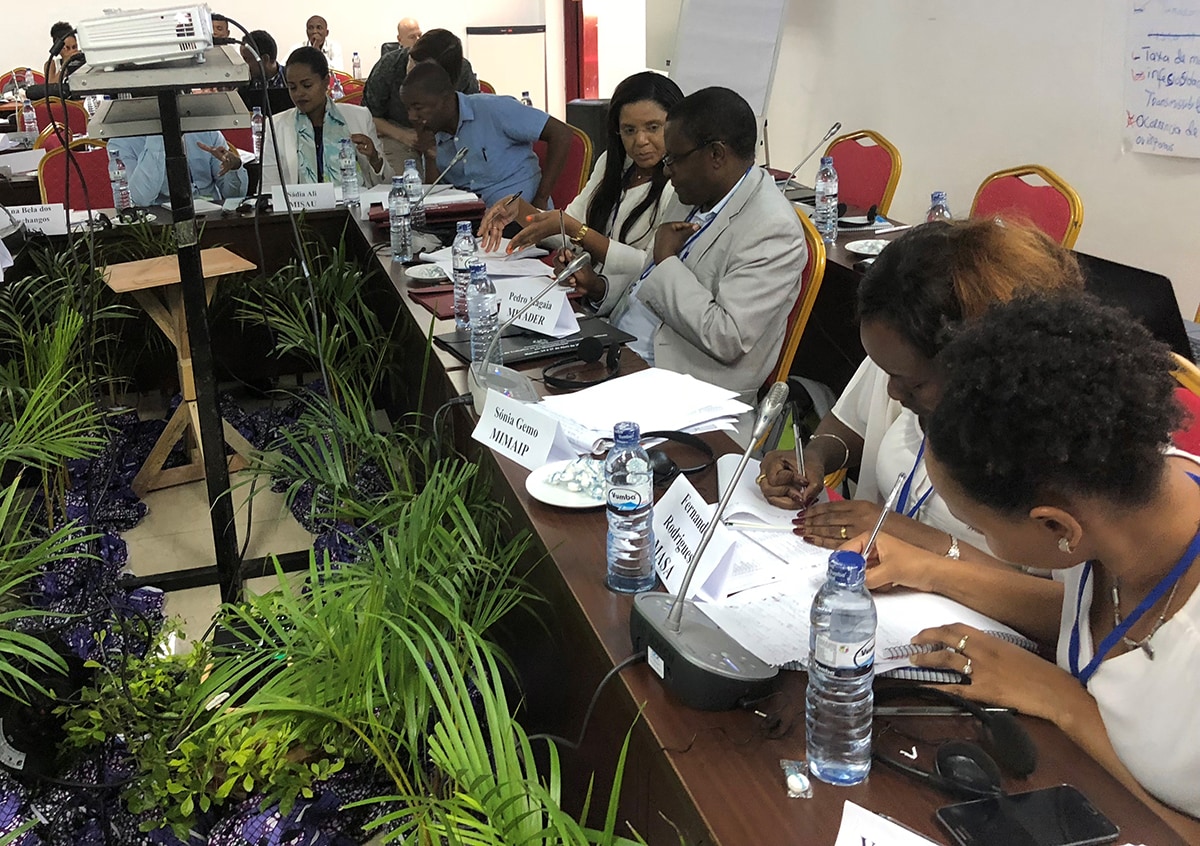One Health, Many Approaches: CDC Fosters a One Health Strategy in NPHIs
June 11, 2021

Africa CDC One Health promotional graphic as part of One Health Framework for NPHIs.
Now more than ever amid COVID-19, countries rely on the technical expertise of National Public Health Institutes (NPHIs) to lead public health responses. The pandemic has put a spotlight on zoonotic diseases — or diseases that spread between animals and humans — and the importance of human, animal, and environmental health specialists working together across sectors to apply a One Health approach in strengthening global health security.

Africa CDC One Health promotional graphic as part of One Health Framework for NPHIs.
- 60% of existing human infectious diseases are zoonotic.
- 75% of emerging infectious diseases of humans (including Ebola, HIV, and influenza) have an animal origin.
- 80% of agents with potential bioterrorist use are zoonotic pathogens.
- 80% of agents with potential bioterrorist use are zoonotic pathogens.
Africa CDC Prioritizes a One Health Strategy
Seventy-five percent of emerging infections in humans are zoonotic diseases. Ebola, rabies, COVID-19, and many other diseases are zoonotic. The ongoing COVID-19 pandemic and concerns over its animal origin have once again propelled zoonotic diseases and the interaction of animal, human, and environmental health to the forefront of public health.
Africa Centres for Disease Control and Preventionexternal icon (Africa CDC), a technical public health institution of the African Union, has prioritized weaving One Healthexternal icon into its work and has increased infectious disease diagnosis capacity in human and animal laboratories. In addition, they developed a One Health frameworkexternal icon for NPHIs focusing on overall coordination, surveillance, laboratory systems, emergency management, and workforce. Developed with specialists from across the Africa Union (AU) Member States, U.S. Centers for Disease Control and Prevention (CDC), the Food and Agriculture Organization of the United Nations, and Chatham House, the framework officially launched in October 2020. Its goal is to help AU members comply with International Health Regulations and achieve both the AU Agenda 2063: The Africa We Wantexternal icon and the United Nations’ Sustainable Development Goalsexternal icon.
In 2020, Africa CDC organized virtual workshops advocating for incorporating a One Health approach to COVID-19 response efforts. The workshops shared examples of multisectoral response efforts such as using veterinary laboratories to help detect human COVID-19 infections. The Pan African Veterinary Vaccine Centre of the African Union, South Africa, and Ghana discussed best practices and the important role veterinary laboratories have been playing in the COVID-19 response. This rapid cross-sectoral collaboration increased disease surveillance capacity.
The significant global impact of zoonotic diseases demonstrates the importance of addressing public health challenges through a One Health approach. “Leadership, coordination, collaboration, and communication are critical in a country’s efforts to better integrate One Health into health systems,” explains Stephanie Salyer, CDC Technical Advisor to Africa CDC. “Through its multisectoral approach, One Health provides more efficient and sustainable implementation and resource allocation.”
“Through its multisectoral approach, One Health provides more efficient and sustainable implementation and resource allocation.”
— Stephanie Salyer, CDC Technical Advisor to Africa CDC
NPHI Paves the Way for One Health in Mozambique
Mozambique’s National Institute of Health (INS), the country’s NPHI, identified the need for One Health leadership and began spearheading national collaborative efforts in 2014. INS Deputy Director General Dr. Eduardo Samo Gudo Jr., MD, PhD, explained that although the country would see collaboration among One Health sectors during disease outbreaks, these were short-lived. “Soon after epidemics went away, One Health work just stopped, and nothing happened until the next epidemic,” Samo Gudo said. Starting from scratch with each new emergency caused delays and inefficiency.
INS prioritized a One Health approach in Mozambique and ensured their team was staffed by veterinarians as well as human health professionals. Working with the Ministry of Health, INS created a task force partnering across human, animal, and environmental health as well as with other ministries to improve coordination and identify national priorities. INS led targeted cross-sector trainings including ministry and regional staff, incorporated One Health training into post-graduate programs, and developed a module for joint veterinarian and physician training.

One Health taskforce members strategize at the One Health Zoonotic Disease Prioritization Workshop in Mozambique in April 2018. Photo: CDC One Health Office
For the past two decades, CDC has worked closely with INS through the CDC Mozambique country office to strengthen the country’s public health response capacity. With a specialized focus on responding to the national HIV epidemic, CDC Mozambique and INS have expanded and improved the country’s laboratory network and health surveillance systems through funding from the U.S. President’s Emergency Plan for AIDS Relief (PEPFAR). The organizations have shared knowledge through several collaborative initiatives. For example, Strengthening Laboratory Management Toward Accreditation has focused on improving laboratory service quality. In addition to PEPFAR´s resources, CDC has used the U.S. President´s Malaria Initiative funding to support the INS, the Ministry of Health, and the Eduardo Mondlane University in establishing a master-level Field Epidemiology and Laboratory Training Program. The program has trained dozens of Mozambican disease detectives, who have been instrumental in the investigation of several diseases outbreaks that occurred in Mozambique and other regional countries over the past decade.
In 2018, INS received seed funding from CDC’s NPHI Program and partnered with CDC’s One Health Office to bring together representatives from the Ministries of Agriculture, Environment, Fisheries, and Human Health for a One Health Zoonotic Disease Prioritization (OHZDP) workshop. To date, CDC has worked with more than 25 countries, regions, and sub-national jurisdictions to conduct OHZDP workshops. These sessions use a transparent approach to incorporate equal input from all represented health sectors working to prioritize zoonotic diseases at the human-animal-environment interface. In addition to developing a priority list for Mozambique, the OHZDP workshop led to greater awareness of One Health issues and increased cross-sector commitment to engage in activities including zoonotic disease detection, prevention, and control.
Mozambique’s hard work and collaboration across One Health sectors paid off in early 2019. Following back-to-back cyclones, INS worked effectively on cyclone-related response activities with other ministries, calling upon relationships made stronger by the OHZDP workshop. Improved communication across sectors led to better coordination during the response, as each group informed the others about their respective investigations and shared surveillance activity results.
Mozambique Ministry of Agriculture’s Perspective on One Health
“After we completed [animal] sampling, we shared all the results with INS and the other ministries. Through collaboration, we were able to discuss our work before starting investigations.”
Planning ahead, Gudo stated that “It is essential to improve multisectoral communication through zoonotic unity so Mozambique can better prevent, detect, and respond to One Health threats.” Mozambique also plans to further integrate One Health into its public health system through initiatives including human and animal laboratory rapid disease detection networks, surveillance best practices, and One Health principle-focused workforce development. Thanks to the OHZDP workshop and increased commitment, INS and the other One Health sectors continue to make progress.
Looking Ahead: One Health Global Efforts
As nations and networks expand their abilities to prevent, detect, and respond to zoonotic disease threats and other One Health issues, Africa CDC and Mozambique’s NPHI early coordination show the value in having a strong leadership to establish or enhance One Health coordination, collaboration, and communication.
